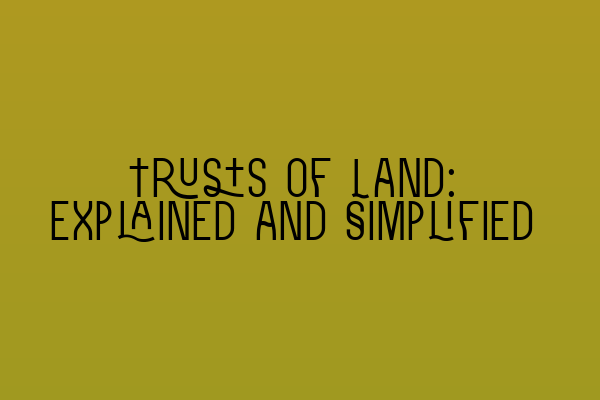Trusts of Land: Explained and Simplified
When it comes to property law, trusts of land play a significant role in determining the ownership and management of property. Whether you are a homeowner, a property investor, or a legal professional, understanding trusts of land is crucial. In this article, we will simplify and demystify trusts of land, providing you with a comprehensive overview of their purpose, types, and key elements.
Before we delve into the specifics of trusts of land, it’s important to have a basic understanding of what a trust is. In essence, a trust is a legal arrangement where one party, known as the ‘trustee,’ holds property or assets for the benefit of another party, known as the ‘beneficiary.’
The Purpose of Trusts of Land
Trusts of land serve as a mechanism to formalize the legal arrangements related to the ownership and management of property. They offer a way to hold property for the benefit of multiple individuals or entities, providing clarity, protection, and flexibility.
The Types of Trusts of Land
In the realm of trusts of land, two main types are commonly encountered: express trusts and implied trusts.
1. Express Trusts
An express trust is created intentionally, with the terms and conditions stated explicitly in a written document, such as a trust deed or a will. The settlor, also known as the person creating the trust, transfers the property to the trustee(s) for the benefit of the specified beneficiaries. Express trusts provide a clear framework for the management and distribution of the property, ensuring that the settlor’s wishes are upheld.
2. Implied Trusts
Implied trusts, on the other hand, arise by operation of law or inference based on the actions and intentions of the parties involved. Unlike express trusts, implied trusts don’t have specific terms and conditions written down. Instead, the trust is deemed to exist due to the circumstances and conduct of the parties involved. Implied trusts often arise in situations where property is held jointly, but the co-owners have different interests or contributions.
The Key Elements of Trusts of Land
While each trust of land may have its specific details and variations, certain key elements are essential to understand and consider:
1. Trustees
Trustees are individuals or legal entities responsible for managing and administering the trust property in the best interests of the beneficiaries. They have a fiduciary duty to act honestly, fairly, and in accordance with the terms of the trust. Appointing trustworthy and capable trustees is crucial to ensure the proper management of the trust property.
2. Beneficiaries
The beneficiaries are the individuals or entities entitled to benefit from the trust property. Beneficiaries can be specifically named individuals or defined classes of individuals, such as children or descendants. It’s important to clearly identify the beneficiaries to avoid ambiguity or disputes in the future.
3. Trust Property
The trust property refers to the asset or assets held within the trust. It can be real estate, shares, investments, or any other form of property. Proper identification and documentation of the trust property are essential to avoid any confusion or challenges to the trust’s validity.
4. Trust Deed or Instrument
The trust deed or instrument is a legally binding document that outlines the terms and conditions of the trust. It provides the framework for how the trust property will be managed, distributed, and controlled. A well-drafted trust deed is crucial to ensure clarity and accountability within the trust.
Conclusion
Trusts of land play an integral role in property law, providing a structured and legally recognized framework for the ownership and management of property. Understanding the purpose, types, and key elements of trusts of land is essential for all property owners, investors, and legal professionals.
If you want to dive deeper into the world of property law, make sure to check out our related articles:
- SQE 1 Practice Exam Questions
- SQE 1 Practice Mocks FLK1 FLK2
- SQE 2 Preparation Courses
- SQE 1 Preparation Courses
- SRA SQE Exam Dates
At SQE Property Law & Land Law, we offer expert legal services for all your property law needs. Whether you require assistance with trusts of land, property transactions, or dispute resolution, our team of knowledgeable professionals is here to help. Contact us today to schedule a consultation with one of our experienced solicitors.
